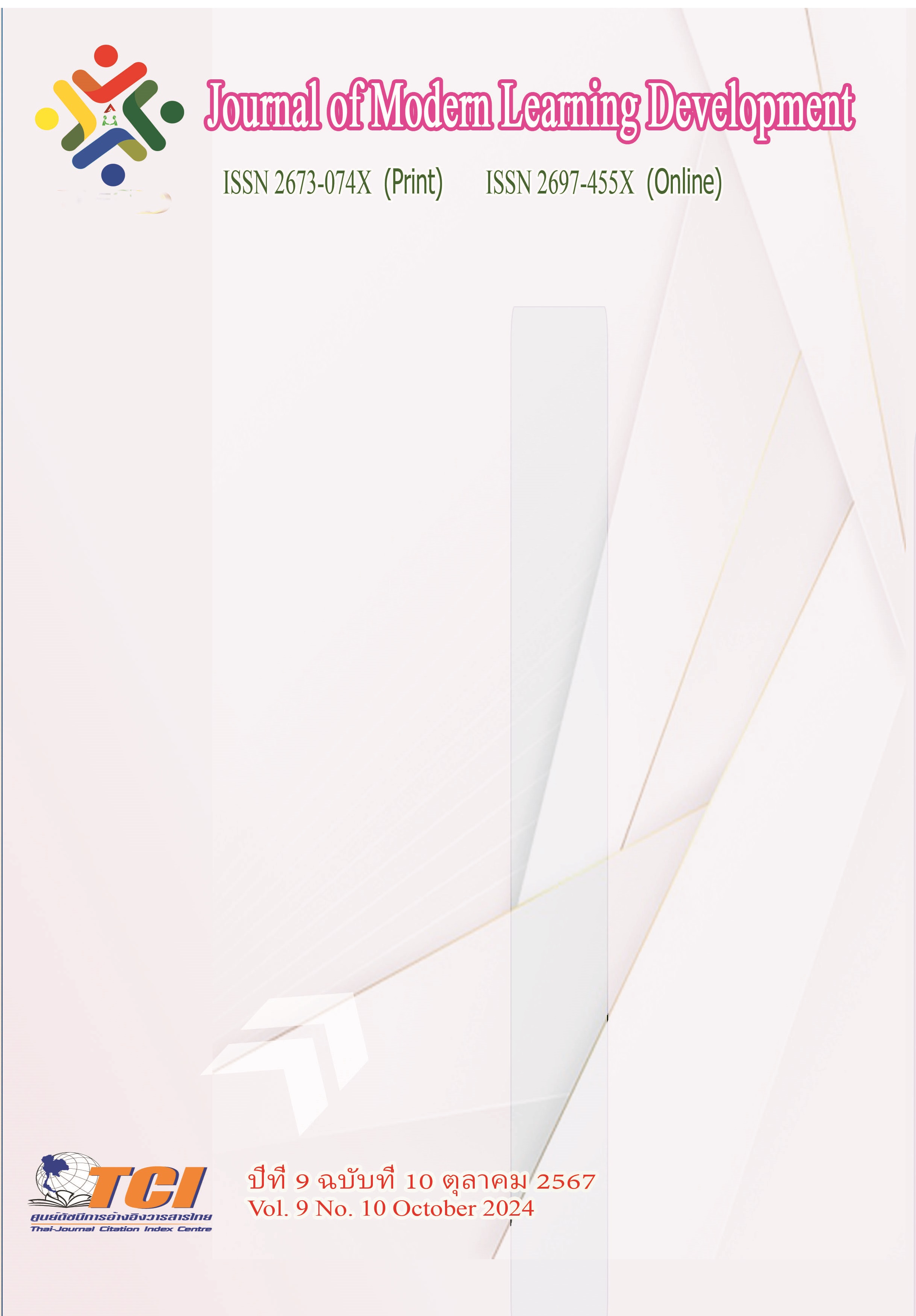The Development of Third-Grade Students’ Learning Achievement in Science Subject Through the Intrgration of an Inquiry-Based Learning Approach (5 E) and the Science Exercises Titled Air Around Us
Main Article Content
Abstract
This study aimed to 1) develop science exercises for third-grade students; 2) compare the learning achievement in science subject of third-grade students before and after learning through the integration of an inquiry-based learning approach (5 Es) and the science exercises titled “Air Around Us”; and 3) examine the satisfaction of students towards the integration of an inquiry-based learning approach (5 Es) and the science exercises. The sample consisted of 35 students from Pathomsuksa 3/9 at Banbangkapi School, Bangkapi District Office, Bangkok, in the second semester of the academic year 2023. The research instruments were 1) the science exercises and 2) the pre- and post-learning achievement tests. The data were analyzed using mean scores, standard deviations, and percentages.
The findings revealed that 1) all the items in the science exercises, “Air Around Us”, were validated by three experts and showed an IOC level at 1, indicating their suitability and alignment with the learning objectives and ensuring the suitability for developing basic science skills for third-grade students; 2) the average scores of students’ learning achievement were statistically higher after learning through the integration of an inquiry-based learning approach (5 Es) and the science exercises, at a significant level of 0.05; and 3) the overall satisfaction of students towards the integration of an inquiry-based learning approach (5 Es) and the science exercises was ‘most satisfied’.
Article Details
References
กรมวิชาการ. (2542). กระบวนการเรียนรู้และยุทธศาสตร์การเรียนรู้. กรุงเทพมหานคร: เดอะมาสเตอร์ กรุ๊ปแมนเนจ-เม้นท์ จำกัด.
กระทรวงศึกษาธิการ. (2560). ตัวชี้วัดและหลักสูตรแกนกลาง กลุ่มสาระการเรียนรู้วิทยาศาสตร์ (ฉบับปรับปรุง พ.ศ. 2560) ตามหลักสูตรแกนกลางการศึกษาขั้นพื้นฐาน พุทธศักราช 2551). กรุงเทพมหานคร: โรงพิมพ์ชุมนุมสหกรณ์การเกษตรแห่งประเทศไทย.
ชัยวัฒน์ สุทธิรัตน์. (2561). ปแบบการพัฒนาความสามารถในการจัดการเรียนรู้ในศตวรรษที่ 21 ของครูโดยใช้ชุมชนแห่งการเรียนรู้เชิงวิชาชีพในการศึกษาชั้นเรียนและการชี้แนะโดยพี่เลี้ยงของมหาวิทยาลัย.วารสารศึกษาศาสตร์ มหาวิทยาลัยนเรศวร. 12 (2), 47-63.
ณพัฐอร บัวฉุน. (2561). การพัฒนาแบบฝึกเสริมทักษะกระบวนการ ทางวิทยาศาสตร์ขั้นพื้นฐาน เรื่อง วัสดุรอบตัวเรา กลุ่มสาระการเรียนรู้วิทยาศาสตร์ ชั้นประถมศึกษาปีที่ 3. วารสารวิจัยและพัฒนา วไลย-อลงกรณ์ ในพระบรมราชูปถัมภ์ สาขา มนุษยศาสตร์และสังคมศาสตร์. 13 (1), 133-139.
ทิศนา แขมมณี. (2558). ศาสตร์การสอน: องค์ความรู้เพื่อการจัดการกระบวนการเรียนรู้ที่มีประสิทธิภาพ. (พิมพ์ครั้งที่ 19). กรุงเทพมหานคร: ด่านสุทธาการพิมพ์.
ธนพร มนเพียรจันทร์ และ ศิริพร พึ่งเพ็ชร์. (2565). การศึกษาทักษะการใช้คอมพิวเตอร์ในชีวิตประจําวันและความพึงพอใจต่อการจัดกิจกรรมการสืบเสาะหาความรู้ 5 ขั้น(5E) ของนักเรียนชั้นมัธยมศึกษาปีที่ 1. วารสารนวัตกรรมการจัดการศึกษาและการวิจัย. 5 (1), 61-72.
นิภา ตรีแจ่มจันทร์. (2562). การพัฒนาทักษะกรพะบวนการทางวิทยาศาสตร์และความสามารถในการทำโครงงานของนักเรียนชั้นประถมศึกษาปีที่ 5 ด้วยการจัดการเรียนรู้แบบโครงงาน. วิทยานิพนธ์ปริญญามหาบัณฑิต. บัณฑิตวิทยาลัย: มหาวิทยาลัยศิลปากร.
สถาบันส่งเสริมการสอนวิทยาศาสตร์และเทคโนโลยี. (2555). เอกสารประกอบการประชุมปฏิบัติการรูปแบบการจัดกระบวนการเรียนรู้แบบวัฏจักรการสืบเสาะหาความรู้ 5 ขั้นตอนเพื่อพัฒนากระบวนการคิดระดับสูง.สาขาชีววิทยา. กรุงเทพมหานคร: คุรุสภาลาดพร้าว.
สถาบันส่งเสริมการสอนวิทยาศาสตร์และเทคโนโลยี. (2560). คู่มือการใช้หลักสูตรรายวิชาพื้นฐานวิทยาศาสตร์ กลุ่มสาระการเรียนรู้กลุ่มวิทยาศาสตร์ (ฉบับปรับปรุง พ.ศ. 2560) ตามหลักสูตรแกนกลางการศึกษาขั้นพื้นฐาน พุทธศักราช 2551 ระดับมัธยมศึกษาตอนต้น. ออนไลน์. สืบค้นเมื่อ 24 มีนาคม 2567. แหล่งที่มา: https://www.scimath.org/e-books/8923/flippingbook/index.html.
ศิริชัย กาญจนวาสี. (2556). ทฤษฎีการทดสอบแบบดั้งเดิม. (พิมพ์ครั้งที่ 7). กรุงเทพมหานคร: สำนักพิมพ์แห่งจุฬาลงกรณ์มหาวิทยาลัย.
สำนักงานเลขาธิการสภาการศึกษา. (2560). แผนการศึกษาแห่งชาติ พ.ศ. 2560 – 2579. กรุงเทพมหานคร: พริกหวานกราฟฟิค จำกัด.
Choowong & Worapun. (2021). The Effects of 5E Inquiring-Based Learning Management on Grade 7 Students’ Science Learning Achievement. Journal of Educational Issues. 8 (2), 193-201.
Desouza, (2017). Nazziwa et al., (2022). Exploring the integration of ChatGPT in inquirybased learning: Teacher perspectives. International Journal of Technology in Education (IJTE). 7 (2), 200-217.
Kulapian et al., (2023). Inquiry-Based Learning in Natural Sciences through the Application of the 5e Model to Develop Natural Inquiry Competence for Middle School Students in Vietnam. 6 (4), 206-216.
Rubio and Garcia Conesa. (2022). Inquiry-Based Learning in Primary Education. Journal of Language and Linguistic Studies. 18 (2), 623-647.


